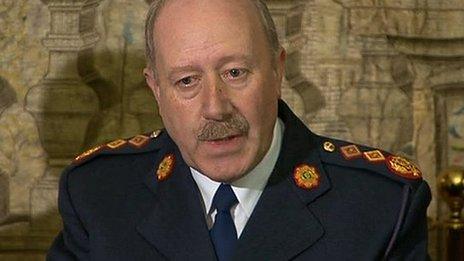Garda Commissioner Martin Callinan resigns over whistleblower row
- Published

Commissioner Martin Callinan announced his decision on Tuesday
The head of the Irish police force has resigned following a controversy over whistleblowers.
Garda Commissioner Martin Callinan informed Justice Minister Alan Shatter of his decision to resign on Tuesday.
Two officers had raised concerns about flaws in the penalty points system.
Mr Callinan told a parliamentary committee the claims were "disgusting", but he was urged to withdraw his remarks after an independent report recommended major reform of the system.
The whistleblowers - Sgt Maurice McCabe and now-retired John Wilson - had claimed that senior police officers had inappropriately wiped the penalty points from the driving licences of often well-connected offenders.
'Credible'
The pair made their allegations to the Public Accounts Committee of the parliament of the Republic of Ireland.
When Mr Callinan appeared before the committee, he described the actions of the two whistleblowers as "disgusting".
Since then, a report by the independent Garda Inspectorate found that there were consistent and widespread breaches of policy by those charged with administering the penalty points system.
The inspectorate also found Sgt McCabe's information was "credible".
Last week, Minister for Transport Leo Varadkar said that if he could choose one word to describe the two officers' actions it would be "distinguished", and added that the garda commissioner "was not above criticism".
In the Dáil (parliament) on Tuesday, Fianna Fáil leader Micheál Martin and Sinn Féin leader Gerry Adams both pressed Taoiseach Prime Minister Enda Kenny to ask the justice minister, Mr Shatter, to resign as well.
Mr Kenny said he would not be doing so.
He accused Mr Adams of only being interested in "getting another head on the plate" and said Mr Shatter would continue to reform the justice system.
"He will bring our system into the modern era, so everyone in the country can have confidence in it," Mr Kenny said.
'Major changes'
In his resignation statement, Mr Callinan said he had taken the decision to retire from his post in "the best interests of An Garda Síochána (Irish police) and my family".
"Having joined An Garda Síochána in May of 1973, it has been a great honour and privilege to have spent nearly 41 years as a member of this tremendous organisation, serving the people of Ireland," he added.
Mr Callinan, who was appointed Garda Commissioner in 2010, said the last four years had seen "major changes" within the police force, some of which had "not always been easy".
However, he said the changes had "resulted in a reduction in crime throughout the country".
He sent his "best wishes and wholehearted support" to his successor and all other members of the police force.
Cabinet ministers are discussing the issue on Tuesday.
'Vindicated'
Padraig Mac Lochlainn, Sinn Féin justice spokesman and chairman of the Public Service Oversight Committee, said Mr Callinan had made the right decision.
"From the moment that the allegations from the two Garda whistleblowers, Maurice McCabe and John Wilson, emerged about widespread malpractice of the penalty points issue the Garda Commissioner sought to downplay and even dismiss the allegations," he said.
"Worse, he repeatedly sought to discredit the credibility of the two whistleblowers which culminated in the outrageous 'disgusting' comment at the Public Accounts Committee."
Mr Mac Lochlainn said recent separate reports in the penalty points controversy by both the Comptroller and Auditor General and the Garda Inspectorate vindicated the core allegations of the whistleblowers.
One of the two officers, Mr Wilson, told Irish state broadcaster RTÉ that while Mr Callinan had served his country during his long career, "his position had become untenable and his decision to resign was the correct one".
Mr Callinan was due to retire in August 2013 but Justice Minister Alan Shatter tweaked a ban on officers serving past the age of 60 to allow the police chief serve for two more years.
The order came at a time when hard-hitting cutbacks and reforms had to be inflicted on the service under the Republic of Ireland's economic rescue package.
However, the financial woes, including the closure of 100 police stations, appeared to be the least of his worries, as he was forced to battle several high-profile fall-outs about alleged police wrongdoing.
Tensions
Last year, the long-running High Court judge-led Smithwick inquiry said the Garda remained a force where "loyalty is prized over honesty" as it concluded officers colluded in the murders of two Royal Ulster Constabulary officers in 1989.
Last May the Garda Síochána Ombudsman Commission (GSOC) accused the service of withholding vital evidence from its inquiry into allegations that elite officers colluded with a convicted drug trafficker.
The independent watchdog set up to investigate police wrong-doing claims a specialist unit within the service turned a blind eye to drug dealer Kieran Boylan's activities in exchange for information on other dealers.
The row laid bare mounting tensions between police and the watchdog.
Claims by GSOC earlier this year that its headquarters in central Dublin had been bugged by government-level technology has led to another inquiry, headed by a retired High Court judge.
Tribute
A dossier of alleged police wrongdoing gathered by the whistleblowers is being investigated in a government-appointed inquiry by a senior lawyer.
In a statement, the Association of Garda Chief Superintendents paid tribute to the outgoing commissioner.
"In the course of a long and distinguished career in An Garda Síochána, Commissioner Callinan served the people of Ireland with commitment and dedication at all times." it said.
The Deputy Garda Commissioner, Noirín O'Sullivan, has been tipped as a possible successor for Mr Callinan.
If successful, the Dubliner would become the 20th commissioner and the first woman to hold the top job in Irish policing since the foundation of the state.
- Published21 March 2014
- Published12 March 2014
- Published21 February 2014
- Published23 January 2014
- Published30 January 2014